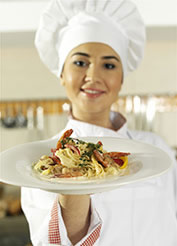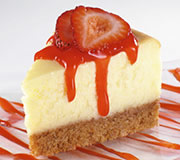Recent News

“Most helpful, pleasing and
honest in our dealings. He possesses a personality that allows him
to fit easily into any organisation requiring his
services…”
Consulaat Der Nederlanden, Dutch Consulate, Brisbane –
Private Catering
“Please pass on my compliments to
your Chef Dacio … such a great chef. Food will pale in
comparison to the culinary delights we were treated to
today.”
Featured News

In a country where candy displays are perched next to cash registers at every retail outlet imaginable and drinking soda is a birthright, it can hardly be surprising that Americans consume a large amount of sugar. But 22 teaspoons a day? That's hard to swallow.
Yet the statistic is true. U.S. adults consume 22.2 teaspoons of sugar daily -- or 355 calories, reports UPI. That wildly exceeds the daily recommended amount, says Phil Lempert, a food industry analyst. He says average-sized women should be consuming no more than 6.25 teaspoons; men 9.4.
Breaking News
That premium extra-virgin olive oil
you shelled out a little extra for may not be quite as premium as
you'd hoped, according to a second study released yesterday by the
UC Davis Olive Center and the Australian Oils Research
Laboratory.
According to the report, researchers found that five of the
top-selling imported "extra virgin" olive oil brands in the U.S.
were inconsistent, and that 73 percent of the samples tested failed
sensory standards, which indicated they were of poor quality or had
been adulterated with cheaper refined oils like canola, seed or nut
oils.
The Los Angeles Timesreports that
the brands tested included Filippo Berio, Bertolli, Pompeian,
Colavita and Star.
It's the second study released by the groups in the last year. The
first was published last summer, but drew heavy criticism for small
sample sizing, unknown storage conditions and testing methods. And
already, the current report is coming under attack by the North
American Olive Oil Association, which represents marketers,
packagers and importers of olive oil.
"Consumers can continue to trust the quality of the imported olive
oils they buy in supermarkets throughout the United States,
contrary to what the authors of a report funded by a small
contingent of domestic oil producers would like them to believe,"
the release says.
Thanksgiving, many of us will eat way more than
normal and then waddle away contented, with a turkey and sweet
potato buzz. Having a belly stuffed with comforting food can
feel like a warm hug from the inside. Evolution has given us the
instinct to eat a lot every time we can, preparing for hard times.
It's the drive to survive, like puffy-cheeked squirrels storing up
for the winter. It's also fueled by competition: beating the others
to the food.
Our brains reward us for it, by releasing pleasure chemicals -- in
the same way as drugs and alcohol, experts say.
Scientists studying that good feeling after eating call it
ingestion analgesia, literally pain relief from eating.
"There are reward circuits to make you enjoy eating," said Roger
Cone, professor and chairman of molecular physiology and biophysics
at Vanderbilt University. "If we didn't eat, we wouldn't
survive."
The rewarding feeling ensured survival of the species.
"For most animals and most of human history, we have not had excess
of calories," Cone said. "Animals and humans had to work harder to
survive. But now, with unlimited calories everywhere for most
people and a great reduction in the amount of physical activity,
we've become obese."